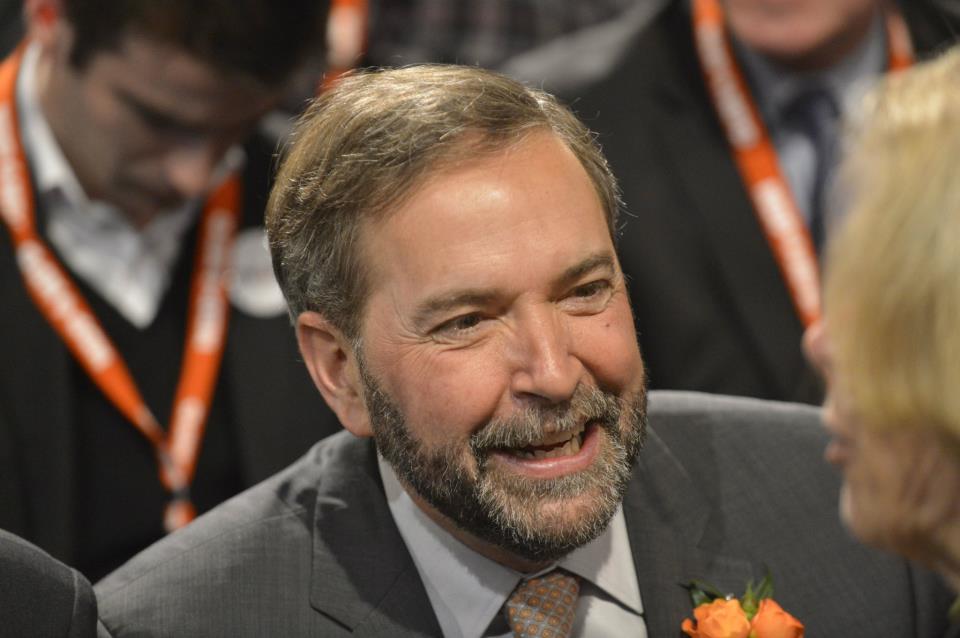Progressive politics is Alberta-bound !!
On May 5, 2015, Canadians witnessed a rare political phenomenon: Alberta’s NDP swept to power, growing from a meager four MLAs to winning 53 of 87 seats! In the process, Albertans tossed aside a tired and arrogant “Progressive” Conservative Government that had been in power for the last 44 years.
This historic event was reminiscent of something similar that took place at the national level four years earlier. On May 2 2011 Canada’s NDP defied all the media pundits as they virtually swept across Quebec, growing from one seat to 59! The 2011 federal election resulted in the NDP having its largest federal caucus ever as its 103 MPs became the Official Opposition.
Both of these surges are often referred to as examples of an orange wave, some even say an orange tsunami, the growth is so quick and so large. Corporate media pundits sometimes call them “rogue” waves to indicate that the threat to the status quo is likely minimal. (No surprise really, as corporate media tend to prioritize corporate interests over concepts like civil society and the commons.)
But are these NDP bursts of electoral success mere rogue waves? Or can Canadians expect to see more of these tsunami-like surges in future elections?
A few days before Alberta’s recent election — and on the fourth anniversary of the 2011 NDP electoral breakthrough — Tom Mulcair, leader of the federal New Democratic Party, appeared on the northern plains. More specifically, Mr. Mulcair came to Saskatoon, the largest city in Saskatchewan. (Significantly, this is the province that gave rise to the first orange tsunami back in 1944 when the Tommy Douglas-led CCF swept to power, the first of five straight majority governments.)
I was there in Saskatoon’s packed TCU Place along with hundreds and hundreds of other people excited to see the federal politician best positioned to restore Canada’s commons and its progressive image on the world stage.
The reception that Mr. Mulcair received and the energy in the packed TCU Place would lead anyone in attendance to conclude that another large orange wave is very possible in the upcoming federal election.
Let’s take a look at this possibility by first looking at the two recent surges.
Most Canadians, even conservatives, could see that federal NDP leader Jack Layton was a very likeable and intelligent man. Of course, his populist appeal and progressive values were major factors in the 2011 orange tsunami. (It is still a source of sadness that we never got the chance to see how good an Opposition leader Jack would be, let alone a Prime Minister.)
Similarly, it is now clear to Canadians that Rachel Notley, Alberta’s first NDP Premier, is also extremely personable, articulate, and bright. “Lovely” is the operative adjective most frequently associated with Alberta’s next premier. Indeed, Edmonton Journal columnist Paula Simons used the phrase “sprinkles of Rachel Dust” to describe the hopes many Albertans have for Notley’s upcoming policies.
The popularity of both Layton and Notley arose out of a progressive populism. Is it the same for the current federal NDP leader? Can we expect to see a huge orange tsunami in the upcoming federal election? Or might October bring a set of lesser but still significantly large orange waves in various parts of the country?
It may be overstating it to describe Mulcair as a populist, but there was definitely an incredibly strong connection he had with the large crowd of Saskatoonians last week.
No one is surprised by Mulcair’s excellent public speaking skills in English and in French. It is obvious that he has statespersonlike qualities and would be quite adept at representing Canada on world stages such as the United Nations.
But what makes me think that Canadians may witness another orange tsunami has more to do with the progressive values of Mulcair’s NDP. Most of us are aware of grotesque wealth inequality in Canada, repeated attacks on workers and their collective bargaining rights, mistreatment of our veterans, a dismantling of the commons, freak storms related to climate change, increasing surveillance and decreasing civil liberties, and a general trend toward a complete corporate takeover of the society in which we live.
Mulcair’s speech in Saskatoon last week addressed all of these issues and more. If the NDP forms government, it will raise taxes on major corporations, something that most Canadians now accept as a no-brainer. It will create a national childcare program, and significantly raise the minimum wage for federal employees. Of course, the federal NDP will honour the collective bargaining rights of workers. And although hesitant to send soldiers to war, they staunchly support the returning veterans, including providing them with needed help.
Mulcair is on record describing a Canada that works to help save our natural world instead of destroying it, of working with other nations to deal with the Climate Change threat, and of regulating industry around both environmental degradation and worker safety. The NDP leader stated that of the three major parties, the NDP is the only one that voted against the Conservatives’ frightening surveillance bill, (aka, C-51), citing the civil liberties of Canadians as a major component of our civil society.
And there are still many more progressive policies that only the NDP can offer. Passing legislation to collect the tens of billions of dollars in unpaid corporate taxes is but one example. Putting even a fraction of that money into public healthcare would clearly be a winner for the public. Pushing for a living wage for all workers is another, as is money for research & development of alternative energy sources. Listening to Canada’s Indigenous peoples, as many NDP MPs are calling for, can only lead to increased social and ecological justice. There is clearly a lot of space for Mulcair’s NDP to grow, to connect with Canadians by demonstrating a willingness to listen and to act on behalf of their concerns.
I believe that many Canadians are listening. The enthusiastic reaction of the crowd in Saskatoon was a strong indication that many people believe in the possibility of a federal NDP government. If this happens, they would expect this federal government to enact social democratic policy so that the needs of common Canadians are addressed, and not just the profit margins of shareholders.
All of the NDP’s positions on economic and social issues speak to the day-to-day reality of middle-class and working-class people. Canadians who adhere to the anybody-but-conservatives philosophy might take a fancy to the social democratic alternative, some for the first time in their voting lives. Jack Layton’s NDP rode a wave of popularity to become the Official Opposition. Perhaps another orange wave, even bigger than the last ones, will propel the federal NDP into government.
Las Vegas would have given the lowest odds for NDP surges in Quebec and Alberta. Yet, orange waves quickly swept across these two unlikely provinces. Anything is possible, including the biggest orange wave yet. Perhaps it is the image of a massive orange tsunami that will be giving Stephen Harper and his Conservative minions their worst autumnal nightmares.

Editor’s note: an earlier version of this blog post erroneously referred to Rachel Notley as “Alberta’s first female premier.” Alison Redford was Alberta’s first woman premier. rabble.ca regrets the error.
Image: Wikimedia commons



